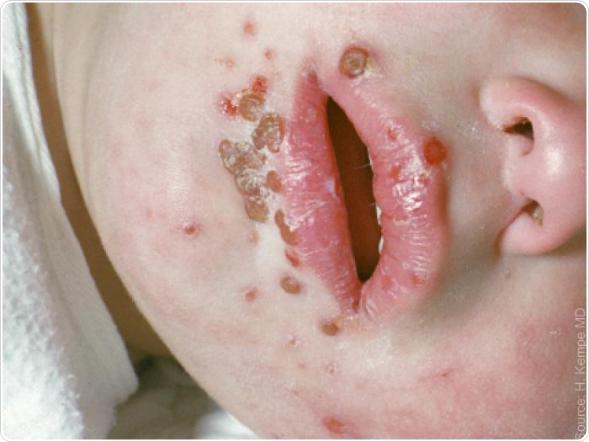For The Latest Medical News, Health News, Research News, COVID-19 News, Pharma News, Glaucoma News, Diabetes News, Herb News, Phytochemical News, Thailand Cannabis News, Cancer News, Doctor News, Thailand Hospital News, Oral Cancer News, Thailand Doctors
Eczema or atopic eczema is a skin condition characterized by chronic inflammation and frequent relapses. There are itchy red rashes over the affected areas that usually involve skin creases such as the folds of the elbows or behind the knees.

Atopic eczema is common and the prevalence of the condition is on the rise. Eczema affects 15-20% of school children and 2-10% of adults. Most of the cases (nearly 80%) are less than 5 years of age. Children with a parent who suffers from the condition are more likely to get the condition.
The most common triggering factors are environmental irritants and allergens. These irritants could be soaps and detergents, contact allergens like certain metals (nickel), inhaled allergens like house dust mites, pollens, pet dander and moulds etc.
Risk factors include:
Food allergies should be suspected in children with atopic eczema who have reacted previously to a food. Certain internal factors may also trigger eczema. These include stress and hormonal changes (for example flare ups just before periods in women and deteriorations during pregnancy etc.)
There is itching, dryness, fine scales or flaking with redness. The severity ranges from mild irritation that does not need medical treatment to severe relentless itching and scratching that leaves the skin raw and weeping secretions.
Repeated episodes may leave the skin thickened and crusted. This more severe form of eczema is called atopic dermatitis. Atopic dermatitis usually appears first in childhood or early adulthood.
Diagnosis can be made by examining the lesions over the skin and looking at the history of similar conditions among first degree relatives and in the individual previously. Other problems like allergies, food allergies, asthma etc. are common in individuals suffering from eczema.
Mild eczema sometimes does not need any treatment. The skin needs to be adequately hydrated. Some may require a steroid cream with 1% hydrocortisone applied a few times a day over the area for relief.
More severe eczema can be more difficult to treat. Medicines such as antihistamines and steroid creams may provide relief from itching. Antihistamine pills can usually prevent the itching of severe eczema. However, these may also cause drowsiness as a side effect. Some antihistamines are available that do not cause drowsiness. Steroids should be used only under medical supervision. These should not be used more often than recommended as serious complications can develop from overuse of steroid medications.
Other measures to prevent occurrence include maintaining adequate humidity by using a humidifier in the rooms, using less amounts of water on the skin to prevent it from drying etc. Every time the skin gets wet, evaporation of water from the skin dries the skin even more. Very hot water should be avoided as it leads to drying up of the skin as well. Frequent use of moisturizing cream or lotion is recommended.